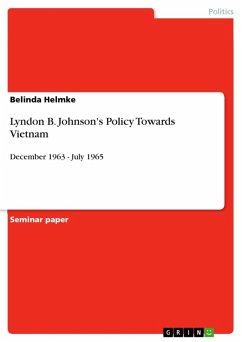Seminar paper from the year 2003 in the subject Politics - Region: USA, grade: 1, Macquarie University, language: English, abstract: "Look, Mr. President, everything that the Secretary of Defense has been telling you this morning, I used to listen to with my French friends. They talked about the fact that there was always a new plan, and (...) that was going to win the day. And they believed it just as much as we're believing it sitting around the table this morning. I can tell you, however, that in the end, there was a great disillusion. And there will be one." - George Ball, 1971 - In spite of the advice given to him by his Under Secretary of State, George Ball, United States President Lyndon B. Johnson decided on the 27th July 1965 to push ahead and increase military forces from 75,000 to 125,000 in Vietnam. With this decision, Johnson escalated the American intervention in Vietnam and made what has been seen as the "formal decision for a major war" . The inability and, to an extent unwillingness, to foresee that the conflict was going to be as catastrophic as it turned out to be is what lead Robert McNamara, Secretary of Defence, to say that the Johnson administration's "greatest failure of all was Vietnam." It was not until April 1975 and then under President Gerald Ford that the United States would finally withdraw from Vietnam, following a defeat of the South Vietnamese forces and a reunification of the country under the leadership of Prime Minister Pham Van Dong. With approximately 58,000 American casualties, not to mention the estimated 1,5 million Vietnamese killed, this military intervention continues to be seen as a sore point of American history .
Dieser Download kann aus rechtlichen Gründen nur mit Rechnungsadresse in A, B, BG, CY, CZ, D, DK, EW, E, FIN, F, GR, HR, H, IRL, I, LT, L, LR, M, NL, PL, P, R, S, SLO, SK ausgeliefert werden.









